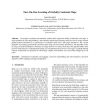Free Online Productivity Tools
i2Speak
i2Symbol
i2OCR
iTex2Img
iWeb2Print
iWeb2Shot
i2Type
iPdf2Split
iPdf2Merge
i2Bopomofo
i2Arabic
i2Style
i2Image
i2PDF
iLatex2Rtf
Sci2ools
140
click to vote
AROBOTS
2002
2002
Fast, On-Line Learning of Globally Consistent Maps
To navigate in unknown environments, mobile robots require the ability to build their own maps. A major problem for robot map building is that odometry-based dead reckoning cannot be used to assign accurate global position information to a map because of cumulative drift errors. This paper introduces a fast, on-line algorithm for learning geometrically consistent maps using only local metric information. The algorithm works by using a relaxation technique to minimize an energy function over many small steps. The approach differs from previous work in that it is computationally cheap, easy to implement and is proven to converge to a globally optimal solution. Experiments are presented in which large, complex environments were successfully mapped by a real robot.
Related Content
| Added | 16 Dec 2010 |
| Updated | 16 Dec 2010 |
| Type | Journal |
| Year | 2002 |
| Where | AROBOTS |
| Authors | Tom Duckett, Stephen Marsland, Jonathan Shapiro |
Comments (0)

